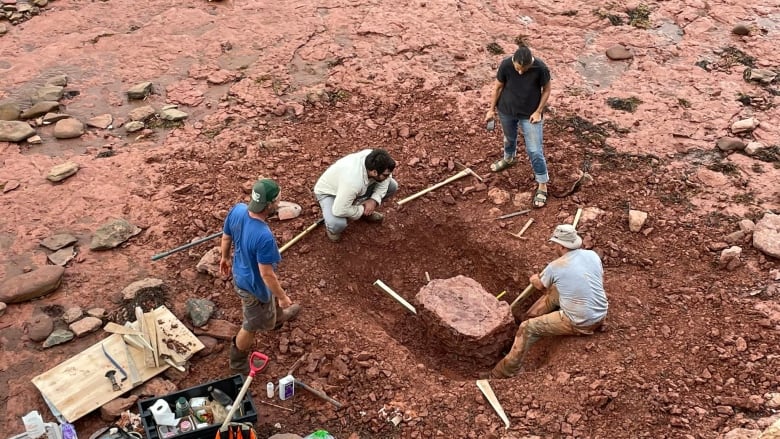Why more fossils are being discovered around the Maritimes
Paleontologist Jade Atkins says climate change is responsible

As more and more fossils are discovered around the Maritimes, a Nova Scotia paleontologist says climate change is responsible.
Last week, a school teacher on Prince Edward Island found the fossil of a creature that dates back approximately 300 million years.
Jade Atkins, the new curator of Joggins Fossil Cliff Centre in Joggins, N.S., says the fossil spent millions of years under heavy sediment and was only revealed after years of the tides going in and out.
"We always have erosion occurring. It's a natural process. Winds, rain, ice, water they can all break apart rocks and wash fragments away," Atkins told CBC Radio's Maritime Noon on Friday.
"And, over time, this causes fossils that were underneath the surface to become visible, like what happened with the specimen found on Prince Edward Island."
Atkins said the erosion has been exacerbated by climate change, as more storms hit the coast and increase in intensity.
She said this is obvious at Joggins.
"I could go out every single day and comb the beach, and I could find new things. After every tide, after every storm, new things are being constantly revealed at Joggins," she said.
Among those finds are often hylonomus, Nova Scotia's provincial fossil, which is an extinct genus of reptile, and fossilized tree stumps.
Atkins said the Joggins team has to act fast when a new fossil is found, and it's usually "a race against the tides to get it off the beach before it's swept away."

She said this means the centre could be losing potential knowledge as climate change makes areas inaccessible or items weather away faster than they can be found.
Atkins said although the fossils are important scientific discoveries, she's conflicted given how climate change is making them appear.
"I feel like improvements in our knowledge of our fossil record, it's not worth these other widespread issues we're finding and it's always a little bittersweet for me," she said.
"I do look at it as a silver lining but I would, of course, rather the cliff not be eroding so quickly, that our coastlines not be eroding so quickly, that these storms we're seeing weren't happening. I would rather not have that, for sure."
With files from CBC Radio's Maritime Noon












_(720p).jpg)


 OFFICIAL HD MUSIC VIDEO.jpg)
.jpg)



























































































